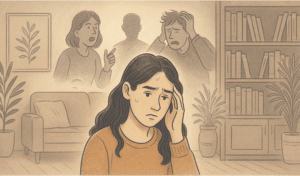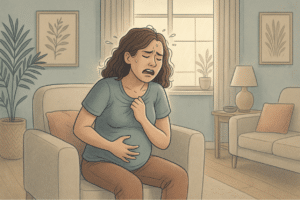Key Takeaways
- Schizophrenia is a complicated mental health problem where a person’s perception of reality is distorted.
- Genetics are a big part of why people develop schizophrenia – about 80% of the risk comes from there.
- Schizophrenia presents a range of symptoms, from hallucinations and delusions (positive symptoms) to social withdrawal and emotional disconnection (negative symptoms).
- Fluphenazine, a first-generation antipsychotic, effectively manages schizophrenia by targeting dopamine D2 receptors to reduce symptoms like hallucinations and delusions.
- While fluphenazine is effective in treating schizophrenia symptoms, it can cause side effects ranging from drowsiness to severe conditions like tardive dyskinesia.
What is Schizophrenia?
Schizophrenia is a mental health condition that impacts how a person thinks, feels, and behaves. This disorder is marked by symptoms like hallucinations, delusions, and disorganized thinking, which can distort an individual’s perception of reality.
Often misunderstood, the term “schizophrenia” translates to “split mind,” which refers not to a split personality but to the fragmented thinking and emotional disconnection typical of the condition. It affects approximately 1% of the global population, usually starting in late adolescence or early adulthood, and can profoundly affect individuals and their communities throughout life. 1
| A Mission For Michael: Expert Mental Health Care Founded in 2010, A Mission For Michael (AMFM) offers specialized mental health care across Southern California, Washington, and Virginia. Our accredited facilities provide residential and outpatient programs, utilizing evidence-based therapies such as CBT, DBT, and EMDR. Our dedicated team of licensed professionals ensures every client receives the best care possible, supported by accreditations from The Joint Commission and the California Department of Health Care Services. We are committed to safety and personalized treatment plans. Start your recovery journey with AMFM today! |
Causes of Schizophrenia
Research indicates that several factors may contribute to this complex mental health condition.
Genetics are a significant factor, as schizophrenia often runs in families. Studies indicate that approximately 80% of the risk for developing schizophrenia is attributable to genetic factors. Individuals with a family history of schizophrenia are significantly more likely to be diagnosed with the disorder themselves.
Environmental factors also play a role—exposure to stress during childhood, complications during pregnancy, or living in poverty can increase the likelihood of developing schizophrenia. Studies indicate that stressful life events occurring within three years prior to the onset of symptoms are particularly impactful. 2
Symptoms of Schizophrenia

Schizophrenia can affect people in different ways, but it usually affects how a person thinks, how they see things, and how well they can function. 3
Symptoms of Schizophrenia Include:
- Hallucinations: People may see or hear things that aren’t there, which can be very upsetting.
- Delusions: A belief that is not based on reality. This can be the result of a misunderstanding.
- Confused Thoughts and Speech: When someone with schizophrenia tries to speak, it can often come out all mixed up. This kind of confusion really throws a wrench into chatting about even simple, everyday stuff, which can be frustrating for them.
- Lack of Interest: People often lose interest in the things they used to enjoy doing.
- Poor Personal Hygiene: People with schizophrenia sometimes find it hard to look after their appearance every day. It’s like they lose track of the little things, like brushing their teeth or taking a shower. This can really affect their overall well-being.
- Avoiding Social Situations: They tend to avoid social interactions, even with close friends or family.
- Emotional Numbness: Individuals might seem emotionally distant or detached, showing little to no emotional reaction to situations that would typically elicit a response.
Types of Schizophrenia
The DSM-5 (Diagnostic and Statistical Manual of Mental Disorders, Fifth Edition) no longer separates schizophrenia into different types. But understanding the old types and the range of symptoms can help us see how the disorder shows itself in different people. 4
- Paranoid Schizophrenia: People with this condition tend to feel really paranoid. They often have strong beliefs that just aren’t realistic, and they frequently hear or see things that aren’t there. These beliefs often include feelings that they’re being treated unfairly or that there’s a secret plan to harm them.
- Disorganized Schizophrenia (Hebephrenic Schizophrenia): This form of schizophrenia is characterised by disorganised speech and behaviour, and inappropriate emotional responses.
- Catatonic Schizophrenia: Defined by extreme motor disturbances, which may include immobility (catatonic stupor) or excessive, purposeless activity (catatonic excitement).
- Undifferentiated Schizophrenia: Diagnosed when symptoms don’t clearly fit into the other types, with a presentation that includes a mix of various symptoms.
- Residual Schizophrenia: Applies to individuals who previously exhibited full-blown schizophrenia symptoms but now only display milder, residual symptoms.
Fluphenazine & How It is Used for Schizophrenia

Fluphenazine—available in forms like tablets, oral solution, and injectable—is a typical antipsychotic used to treat schizophrenia. As a first-generation antipsychotic, it moderates dopamine pathways that are often overactive in schizophrenia, helping to reduce symptoms associated with the disorder.
Fluphenazine is effective in managing positive symptoms of schizophrenia, such as hallucinations and delusions, improving patients’ daily functionality and quality of life. It’s key in comprehensive treatment strategies, including therapy and lifestyle adjustments. It’s also appreciated for its versatility in administration, allowing for tailored treatment plans that cater to the varying needs of patients, from daily oral doses to long-acting injections. 5
How Fluphenazine Works
Fluphenazine targets specific receptors in the brain, mainly the dopamine D2 receptors. By blocking these receptors, it effectively reduces the overactivity of dopamine, which is commonly associated with the positive symptoms of schizophrenia, such as hallucinations and delusions.
This medication mainly acts on dopamine receptors, and it doesn’t have much of an effect on other neurotransmitter systems, like serotonin or acetylcholine. So, it’s less likely to cause the side effects that are often seen with other drugs, such as weight gain and drowsiness. This makes fluphenazine a good choice for treating schizophrenia, especially when it’s causing the most problems. 6
Fluphenazine’s Effects on Schizophrenia
Fluphenazine is highly effective in managing the core symptoms of schizophrenia, including positive symptoms like hallucinations and delusions. This efficacy can significantly enhance the quality of life for those affected.
The effectiveness of fluphenazine in symptom management is well-supported by clinical evidence, which shows a marked reduction in the intensity of schizophrenia’s hallmark symptoms compared to placebo. This positions fluphenazine as a reliable choice among antipsychotic medications. 7
How Long Fluphenazine Takes to Work
The effects of Fluphenazine, whether taken orally or administered through intramuscular (IM) injection, usually occur within 1 hour after administration. The effects usually last for about 6 to 8 hours. This makes Fluphenazine effective for quickly managing symptoms. Patients must follow their doctor’s instructions about how often they should take their medicine so that their symptoms are controlled during the day. 8
Fluphenazine Doses
Fluphenazine is typically prescribed in varying doses depending on the mode of administration and patient needs. For oral administration, initial doses generally range from 0.5 to 10 mg per day, divided into doses given every six to eight hours. After symptoms are controlled, the dosage is often gradually reduced to a daily maintenance dose of 1.0 to 0.5 mg, which can usually be administered as a single daily dose. Maintenance doses above 3 mg per day are rarely necessary.
For intramuscular (IM) administration, the initial dose of fluphenazine ranges from 2.5 to 10.0 mg per day, also divided and administered every six to eight hours. The dosage is adjusted based on the patient’s response and tolerance to the treatment, aiming to achieve optimal control of symptoms with the minimum effective dose. 9
Possible Side Effects of Fluphenazine
Common side effects of Fluphenazine are drowsiness, which can affect concentration and alertness, and dry mouth, which can be mitigated by staying hydrated and using sugar-free gum or candies. Some patients may experience blurred vision or constipation, which can be managed with dietary adjustments and increased fluid intake.
That said, fluphenazine can cause some serious reactions, like tardive dyskinesia, neuroleptic malignant syndrome, and severe allergic reactions. If you experience any of these, you’ll need to see a doctor right away. Most side effects are manageable and may lessen over time. 10
Take the Next Step Toward Better Mental Health

At A Mission for Michael, we understand that living with severe mental health challenges like schizophrenia can be challenging. That’s why we provide 24/7 personalized care in a supportive, home-like environment.
We use evidence-based therapies, such as Cognitive Behavioral Therapy and Dialectical Behavior Therapy, alongside experiential treatments like art and equine therapy to help individuals recover long-term and improve their quality of life.

If you or someone you know is struggling with mental health issues and needs comprehensive care and support, our team is here to help. Get in touch today to find out how our holistic approach can make a difference. Together, we can take the first step toward better mental health and well-being.
Start your recovery journey with AMFM today.
Frequently Asked Questions (FAQ)
What is schizophrenia and how does it affect individuals?
Schizophrenia is a mental health problem where a person’s perceptions of reality are distorted. This can mean hallucinations, delusions, and disorganised thinking. It affects how a person thinks, feels, and behaves.
What are the main causes of schizophrenia?
While we don’t fully understand what causes schizophrenia, we do know that genetics play a big part, accounting for about 80% of the risk. Environmental factors, such as high levels of stress during childhood and problems before birth, also increase the chance of developing the disorder.
What are the common symptoms of schizophrenia?
Schizophrenia is a mental health condition that can cause a range of symptoms. These can be divided into two types: positive symptoms, like hallucinations and delusions, and negative symptoms, such as social withdrawal and emotional disconnection.
How does fluphenazine help in the treatment of schizophrenia?
Fluphenazine is an antipsychotic drug. It works by targeting dopamine D2 receptors in the brain to reduce the overactivity of dopamine. Dopamine is often linked to the positive symptoms of schizophrenia, like hallucinations and delusions.
What are the potential side effects of fluphenazine?
Some of the side effects of fluphenazine include feeling sleepy, having a dry mouth and seeing things out of focus. It can also lead to serious conditions like tardive dyskinesia and neuroleptic malignant syndrome.
Resources
- https://www.nimh.nih.gov/health/topics/schizophrenia
- https://www.mayoclinic.org/diseases-conditions/schizophrenia/symptoms-causes/syc-20354443
- https://www.nhs.uk/mental-health/conditions/schizophrenia/overview/
- https://www.medicalnewstoday.com/articles/192770#current-types
- https://my.clevelandclinic.org/health/drugs/20254-fluphenazine-tablets
- https://www.nami.org/about-mental-illness/treatments/mental-health-medications/types-of-medication/fluphenazine/
- https://medlineplus.gov/druginfo/meds/a682172.html
- https://www.nami.org/about-mental-illness/treatments/mental-health-medications/types-of-medication/fluphenazine/
- https://pmc.ncbi.nlm.nih.gov/articles/PMC6485658/
- https://www.rxlist.com/fluphenazine/generic-drug.htm#what_are_side_effects_associated_with_using_fluphenazine









